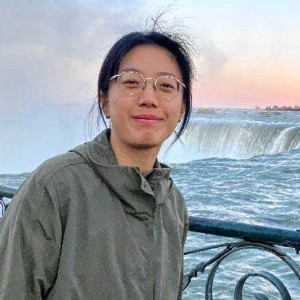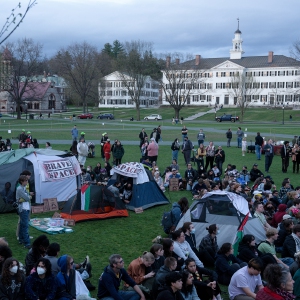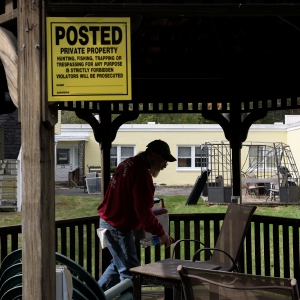A Life: Marie Kirn strove ‘to create joy and peace and understanding’ at the end of life
| Published: 10-16-2023 4:36 AM |
HARTLAND — Marie Kirn liked to talk about death.
She liked to talk about how the medical community could better approach death, how families could prepare for it and how every person should have a say in how they live out the last days of their lives.
“It’s so important,” Kirn said in a 2013 Valley News interview about “death cafes,” where people gathered to talk about end-of-life topics. “This is something facing all of us, and we can do it well. To me, the first step is talking about it.”
Kirn, who spent decades advocating for hospice and advance care planning — and was instrumental in gathering support for what would eventually become the Jack Byrne Center for Palliative & Hospice Care — died at age 88 on April 11.
“She knew how to get things done,” said Dr. Kathy Kirkland, section chief and director of Palliative Care at Dartmouth Hitchcock. “You wanted to be part of something that Marie was part of.”
Along the way, Kirn changed the way people thought about death and all the living that could be done, even if a patient had a terminal illness.
“It became something more than end-of-life care. It became a way of living with serious illness rather than a way of planning how to die,” Kirkland said. “Marie was an empowering force in helping to create that.”
Kirn was born in 1935 in New York City to a devout Catholic family. After earning bachelor’s and master’s degrees in American literature at Brown University, she initially pursued a career in education. In 1965, Kirn moved to Vermont, where she worked at the Weston Priory and for the Vermont Department of Education. She was working at a state education department office in Woodstock when Mary Johnson met her. Johnson was in high school at the time and was upset about the education system in Vermont.
Article continues after...
Yesterday's Most Read Articles
 Police seek assistance in locating missing Dartmouth student
Police seek assistance in locating missing Dartmouth student
 City cites Claremont property owner over demolition of building
City cites Claremont property owner over demolition of building
 Editorial: Dartmouth lets protesters know where they stand
Editorial: Dartmouth lets protesters know where they stand
 DHMC union organizers say they have enough signatures to force vote
DHMC union organizers say they have enough signatures to force vote
 A Life: Elaine Chase ‘was a very generous person’
A Life: Elaine Chase ‘was a very generous person’
Kirn’s office became a place for young people to gather, and they created a student society to advocate for changes to provide stronger educational opportunities. Kirn treated the teenagers like adults, Johnson said. She took their concerns and ideas seriously.
“She gave me the respect of engaging in conversation that was probably far beyond me,” Johnson said. Johnson credits Kirn with encouraging her to attend Sarah Lawrence College in New York, far from the Vermont town where she grew up. “I learned from the very first day I met her that anything is possible: If you just chunk it into little steps, you can do anything at all.”
During this time, Kirn also attended personal growth workshops. At one in Detroit, she met her future husband, Art, a former Catholic priest. The couple, married in 1969, described themselves as “recovering Catholics,” Kirn’s daughter, Sarah Kirn, said.
“My parents were definitely peace-love hippies,” Sarah Kirn said. “They were part of that revolutionary generation, wanting to do things differently.”
In some ways, that made Kirn’s interest in hospice care a natural fit: She was inspired to make it her life’s work after attending a talk by the psychiatrist Elisabeth Kubler-Ross in the mid-1970s, Sarah Kirn said.
“I think part of it … was that it’s such a universal experience and at the time it was a universal experience that was neglected,” Sarah Kirn said about why her mother was drawn to hospice.
While living in southern New Hampshire, Kirn founded Monadnock Hospice in Peterborough in 1979 and later the New Hampshire Hospice Organization. She sat with people as they died and talked to them about what they wanted from the experience. Were there things they wanted to tell their families? Were there amends they wanted to make?
“She had a lot of respect for the mystery,” of what would come next, Sarah Kirn said.
Kirn started working with Dartmouth Hitchcock in the 1980s, before she and her husband moved back to the Upper Valley around 1995. Later, she became executive director of Hospice VNH, which was located in White River Junction. Part of her expertise was focused on teaching medical providers about how to talk about death with their patients.
“We’ve made death a medical event, but of course it’s a spiritual event,” Kirn said in a 1997 Valley News article.
Before Dr. Marie Bakitas met Kirn at Dartmouth, she thought the medical community was doing a decent job at talking to patients about end-of-life care and hospice.
Kirn felt differently — and had no problem telling people so.
“In a beautiful and loving way, like a little bug that was always there in your ear, (Kirn said), ‘You’ve got to do better. We’ve got to do better,’ ” said Bakitas, who was working with cancer patients at the time, including in a support group. “I was blown away.”
Kirn’s critiques prompted Bakitas and her colleagues to do a bit of soul-searching — in part to show Kirn that the care they were providing to patients was good. They surveyed patients about their thoughts on end-of-life care.
“And lo and behold, we kind of learned that we really could do a lot better,” said Bakitas, now co-director of the Center for Palliative and Supportive Care at the University of Alabama at Birmingham.
They realized there was a need to bring up end-of-life care earlier, especially when patients were facing what could become terminal conditions.
In the late 1990s, Bakitas and Kirn worked together on a regional palliative care initiative. One of its goals was to incorporate hospice and palliative care at the Norris Cotton Cancer Center.
“She was really the stimulus,” Bakitas said, of putting those two programs together. She made it a point to remind providers that — though they may wish and work to make it otherwise — not everybody who received a cancer diagnosis could be cured. It was important, Kirn said, to be upfront about that and have those conversations.
“She wasn’t shy at all about using the words death and dying,” Bakitas said. “I can say that there were people that she did evolve.”
While some people may have been put off by Kirn, they listened.
“There was this enthusiasm, intelligence and warmth that pulled you in and welcomed you and helped you to recognize the importance of the things that she was saying,” said Lisa Stephens, a nurse practitioner in palliative care who worked with Kirn at Dartmouth. “She was an infectious leader in that way.”
She also worked to change attitudes surrounding death, said Jill Lord, who was working as an oncology nurse at Dartmouth and the White River VA Medical Center when she met Kirn.
Kirn’s goal was “to create joy and peace and understanding (at the) end of life instead of fear and dread,” Lord said. “It showed that it’s possible to have a ‘good death.’ ”
It was a topic Lord also felt strongly about, and she admired Kirn’s tenacity.
At the time, palliative care hadn’t really taken hold in the Upper Valley, Lord said. Families cared for their loved ones at home, sometimes with assistance from visiting nurses. If people required more care, they were moved to medical settings where their pain was addressed — but not necessarily their spiritual needs.
“It was at a formational and foundational stage, the development of hospice in our region, and Marie got it,” Lord said. “Marie understood what needed to take place and she was a great motivator in bringing people together.”
Kirn met with Dorothy Byrne about the Jack and Dorothy Byrne Foundation, which was founded in 1999, and advocated for funding to for hospice and palliative care programs. In 2017, the Jack Byrne Center for Palliative and Hospice Care opened, which cost $22 million to build.
“I think Marie is smiling knowing that Jack Byrne is a reality and really accomplishing what her goals were for hospice care in the Upper Valley,” Lord said.
In order to garner such support — and funding — Kirn displayed more than passion. She showed a roadmap for how to better provide better end-of-life care to patients. Kirn knew how to gather support — and how to organize that support into something tangible.
Kirn also helped launch a program that trained medical students in palliative care and planning.
Kirn wanted providers to bring up those topics to patients earlier in order to provider better care and she was pleased to see students be open to shifting the perception around end-of-life care.
“I’m thrilled the medical students see hospice as an important part of health care,” Kirn said in a 1997 Valley News article. “… We’ve given so much to technology in the medical field that it’s nice to see people recognize that dying can be an important part of living.”
She gave talks throughout the community about the importance of advance directives. She also helped providers run focus groups with patients and family members about what information they’d like to have known when they were first diagnosed with a serious illness, Bakitas said. She taught workshops for people who were newly diagnosed with cancer. While Kirn had strong views, she didn’t lecture people or tell them to think like her.
“She left openings for people to join her,” Lord said. “She encouraged conversation. She made it OK” to talk about death.
Kirn’s work was far from limited to Dartmouth: She attended anti-war and anti-nuclear protests. She and her husband were among the founders of Cobb Hill Cohousing Community in Hartland. Kirn continued to live there after he died in 2005 and, in the late 2000s, went on to start Aging in Hartland to help older adults stay in their homes. As part of her work with Aging in Hartland, Kirn started a friendly visitor program, where volunteers sat with people who were homebound. If a tree fell in a neighbor’s yard and they couldn’t take care of it, Kirn would organize a group to chop it up.
“She created a community of volunteers, so as volunteers we felt not only helpful, but we enjoyed each other’s company,” said Tom Ripley, who succeeded Kirn as director of Aging in Hartland after she moved to Maine in 2016 to be closer to her daughter.
Kirn frequently gave talks — and wrote letters — about palliative care and the importance of advance directives. Kirn hosted death cafes — where people would meet to eat cake and talk about their views about death.
“She was not uptight about talking about it, therefore it made you relax and talk about it,” Ripley said.
For a long time, Kirn had had a vision for the end of her life.
“She didn’t want to get swept up in the medical system that was so focused on keeping people alive, regardless of quality of life,” Sarah Kirn said.
Toward the end of her life, Kirn was diagnosed with dementia. As the disease progressed, she made the decision to stop eating and drinking.
She qualified for hospice care. After a visit from a nurse, mother and daughter had a moment where they teared up when they thought about Kirn’s decades of advocacy, the work she’d done to grow palliative care and the open conversations she encouraged people to have about death.
“All of a sudden, she was a recipient of that herself,” Sarah Kirn said. “It was really unusual (in the 1970s), and by the time she was ready to be the recipient of these services, it was the norm.”
Liz Sauchelli can be reached at esauchelli@vnews.com or 603-727-3221.









 Developer seeks to convert former Brookside nursing home to apartments
Developer seeks to convert former Brookside nursing home to apartments
